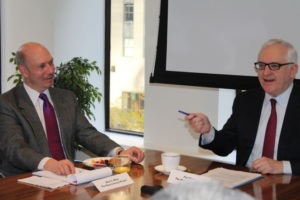Paul Gigot says news literacy is critical to ‘the future of democracy and governance’
During a News Literacy Project VIP breakfast on Oct. 28 at the Journal’s New York City headquarters, Gigot discussed some of the changes roiling the news media by the proliferation of digital technology.
“It’s a hell of a lot easier to write about creative destruction than it is to live through it,” he said, citing the advent of the 24-hour news cycle and the challenge to the news media’s traditional business model as examples of disruptive shifts.
 In this increasingly crowded information landscape, readers are “looking for credible information they can trust,” Gigot said. “That’s the coin of the realm.”
In this increasingly crowded information landscape, readers are “looking for credible information they can trust,” Gigot said. “That’s the coin of the realm.”
He explained that he maintains his section’s credibility by practicing transparency and respecting the “wall” between news and editorial content
“We don’t bury our flag; we wave it,” he said. “Readers know our philosophy. Being trustworthy gives us the capacity to influence people who don’t already agree with us.”
During a question and answer session following his talk, Gigot expressed concern for the future of watchdog journalism at the state and local levels.
“I’m less worried about national accountability than local accountability,” he said. While news organizations will continue to monitor the federal government, he said, it is less certain that smaller papers will be able maintain their capacity for quality investigative journalism at city and town halls and state capitals.
Gigot has been with the Journal since 1980. He won the Pulitzer Prize for commentary in 2000 for his weekly column on Washington politics, “Potomac Watch.”
In his current position, which he has held since 2001, he oversees the Journal’s editorials, op-ed articles and leisure and arts criticism. He also directs the editorial pages of the paper’s Asian and European editions and the OpinionJournal.com website.
The Wall Street Journal is one of NLP’s participating news organizations, and the Dow Jones Foundation is a major supporter.